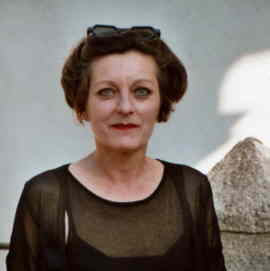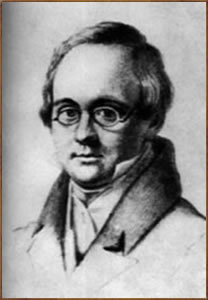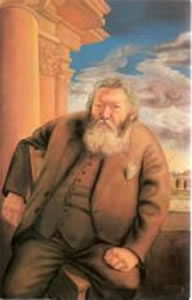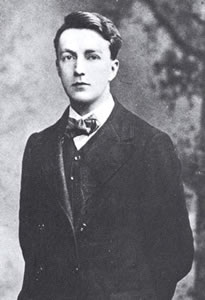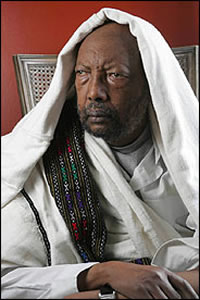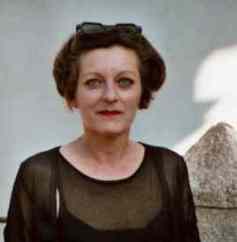De Amerikaanse schrijver en essayist Jonathan Franzen werd geboren op 17 augustus 1959 in Western Springs, Illinois. Zie ook mijn blog van 17 augustus 2007 en ook mijn blog van 17 augustus 2008 en ook mijn blog van 17 augustus 2009.
Uit: Freedom
„She attended to the funeral arrangements for her mother-in-law in a mental state whose fragility the autobiographer hopes at least partly explains her poor handling of her discovery that an older neighbor girl, Connie Monaghan, had been preying on Joey sexually. The litany of the mistakes that Patty proceeded to make in the wake of this discovery would exceed the current length of this already long document. The autobiographer is still so ashamed of what she did to Joey that she can’t begin to make a sensible narrative out of it. When you find yourself in the alley behind your neighbor’s house at three in the morning with a box cutter in your hand, destroying the tires of your neighbor’s pickup truck, you can plead insanity as a legal defense. But is it a moral one?
For the defense: Patty had tried, at the outset, to warn Walter about the kind of person she was. She’d told him there was something wrong with her.
For the prosecution: Walter was appropriately wary. Patty was the one who tracked him down in Hibbing and threw herself at him.
For the defense: But she was trying to be good and make a good life! And then she forsook all others and worked hard to be a great mom and homemaker.
For the prosecution: Her motives were bad. She was competing with her mom and sisters. She wanted her kids to be a reproach to them.
For the defense: She loved her kids!
For the prosecution: She loved Jessica an appropriate amount, but Joey she loved way too much. She knew what she was doing and she didn’t stop, because she was mad at Walter for not being what she really wanted, and because she had a bad character and felt she deserved compensation for being a star and a competitor who was trapped in a housewife’s life.“

Jonathan Franzen (Western Springs, 17 augustus 1959)
De Britse schrijver Sir Vidiadhar Surajprasad Naipaul werd geboren op 17 augustus 1932 in Chaguanas, Trinidad en Tobago. Zie ook mijn blog van 17 augustus 2006 en ook mijn blog van 17 augustus 2007 en ook mijn blog van 17 augustus 2008 en ook mijn blog van 17 augustus 2009.
Uit: Miguel Street
„BOGART
Every morning when he got up Hat would sit on the banister of his back verandah and shout across, ‘What happening there, Bogart?’
Bogart would turn in his bed and mumble softly, so that no one heard, ‘What happening there, Hat?’
It was something of a mystery why he was called Bogart; but I suspect that it was Hat who gave him the name. I don’t know if you remember the year the film Casablanca was made. That was the year when Bogart’s fame spread like fire through Port of Spain and hundreds of young men began adopting the hardboiled Bogartian attitude.
Before they called him Bogart they called him Patience, because he played that game from morn till night. Yet he never liked cards.
Whenever you went over to Bogart’s little room you found him sitting on his bed with the cards in seven lines on a small table in front of him.
‘What happening there, man?’ he would ask quietly, and then he would say nothing for ten or fifteen minutes. And somehow you felt you couldn’t really talk to Bogart, he looked so bored and superior. His eyes were small and sleepy. His face was fat and his hair was gleaming black.
His arms were plump. Yet he was not a funny man. He did everything with a captivating languor. Even when he licked his thumb to deal out the cards there was grace in it.
He was the most bored man I ever knew.
He made a pretence of making a living by tailoring, and he had even paid me some money to write a sign for him:
TAILOR AND CUTTER Suits made to Order Popular and Competitive Prices
He bought a sewing machine and some blue and white and brown chalks. But I never could imagine him competing with anyone; and I cannot remember him making a suit. He was a little bit like Popo, the carpenter next door, who never made a stick of furniture and was always planing and chiselling and making what I think he called mortises. Whenever I asked him, ‘Mr Popo, what you making?’ he would reply, ‘Ha, boy! That’s the question. I making the thing without a name.’ Bogart was never even making anything like this.“

V. S. Naipaul (Chaganuas, 17 augustus 1932)
De Duitse schrijfster Herta Müller werd geboren op 17 augustus 1953 in Nitzkydorf, Roemenië. Zie ook mijn blog van 17 augustus 2008 en ook mijn blog van 17 augustus 2009.
Uit: Niederungen
„Die Grabrede
Auf dem Bahnhof liefen die Verwandten neben dem dampfenden Zug her. Bei jedem Schritt bewegten sie den hochgehobenen Arm und winkten.
Ein junger Mann stand hinter dem Zugfenster. Die Scheibe reichte ihm bis unter die Arme. Er hielt einen Strauß weißer, zerfledderter Blumen vor der Brust. Sein Gesicht war starr. Eine junge Frau trug ein fades Kind aus dem Bahnhof hinaus. Die Frau hatte einen Buckel.
Der Zug fuhr in den Krieg.
Ich knipste den Fernseher aus.
Vater lag in einem Sarg mitten im Zimmer. An den Wänden hingen so viele Bilder, dass man die Wand nicht sah. Auf einem Bild war Vater halb so groß wie der Stuhl, an dem er sich festhielt. Er hatte ein Kleid an und stand auf krummen Beinen, die voller Speckfalten waren. Sein Kopf war birnenförmig und kahl.
Auf einem anderen Bild war Vater Bräutigam. Man sah nur seine halbe Brust. Die andere Hälfte war ein Strauß weißer, zerfledderter Blumen, die Mutter in der Hand hielt. Ihre Köpfe waren so nahe nebeneinander, dass sich ihre Ohrläppchen berührten.
Auf einem anderen Bild stand Vater kerzengerade vor einem Zaun. Unter seinen hohen Schuhen lag Schnee. Der Schnee war so weiß, dass Vater im Leeren stand. Seine Hand war über den Kopf gehoben zum Gruß. Auf seinem Rockkragen waren Runen.
Auf dem Bild, das daneben hing, hielt Vater eine Hacke auf der Schulter. Hinter ihm stand ein Maisstengel, der in den Himmel ragte. Vater hatte einen Hut auf dem Kopf. Der Hut warf einen breiten Schatten und verdeckte Vaters Gesicht.
Auf dem nächsten Bild saß Vater am Lenkrad eines Lastautos. Das Auto war mit Rindern beladen. Vater fuhr jede Woche die Rinder ins Schlachthaus in die Stadt. Vaters Gesicht war schmal und hatte harte Kanten.“
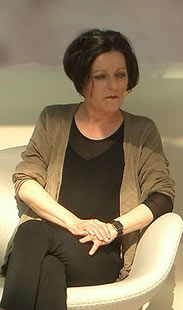
Herta Müller (Nitzkydorf, 17 augustus 1953)
De Ethiopische dichter en schrijver Tsegaye Gabre-Medhin werd geboren op 17 augustus 1936 in Boda bij Ambo. Zie ook mijn blog van 17 augustus 2007 en ook mijn blog van 17 augustus 2008 en ook mijn blog van 17 augustus 2009.
Who Is On Whose Way
I did not know, oh sir, that I stood on your way,
It all happened in chance; argument is unfit,
If we fight, others will benefit,
And as this road is also where my future lay,
Destiny forces me to answer you with “ Nay “
Pray lose no temper: lest you commit
A risk to result in a regrettable wit,
For, if there be crime, guilty is just the day:
I am also in yours as you are in my shoes
So do let us shift sir, to either side
However painful it becomes, we should, though
We realize that it isn’t much to lose
That in spite of us the way is wide
And that after all, someday, both of us go.
Tears Inevitable
Showers of anguish
Rain, do not exhaust
Ocean of revenge
Of the innermost
Voice of the betrayed
Comfort of the lost,
Tears torn of self
Blood of the heart.
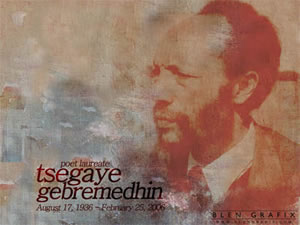
Tsegaye Gabre-Medhin (17 augustus 1936 – 25 februari 2006)
De Franse schrijver en diplomaat Roger Peyrefitte werd geboren op 17 augustus 1907 in Castres. Zie ook mijn blog van 17 augustus 2007 en ook mijn blog van 17 augustus 2008 en ook mijn blog van 17 augustus 2009.
Uit: Der junge Alexander (Vertaald door Sybille A. Rott-Illfeld)
„Sie hatten sich nackt ausgezogen. Der Geruch des Meeres vermischte sich mit dem Duft ihrer Haut. Gedämpft klangen Kitharaklänge (…) an ihre Ohren. Hephaistions Lippen glitten zart über Alexanders Lider. Seit Aristoteles ihnen gesagt hatte, dass die Haut der Lider ebenso empfindlich sei wie die Vorhaut, mochten sie diese Liebkosung ganz besonders. “Erinnerst du dich”, fragte Alexander, “wie wir ihn nach dem Wesen der Lust befragten?” “Er glaubte weder, wie Pythagoras, dass das Sperma aus dem Hirn kommt, noch wie andere Philosophen, aus allen Körperteilen. Er definierte die Lust einfach als `unbändiges Verlangen’, und das schien uns unzureichend. Aber wie soll man solche Dinge auch erklären? Man muss sich damit begnügen, sie zu empfinden.” (…) Ihre Lippen fanden sich und Gott verströmte seine Kraft. (…)
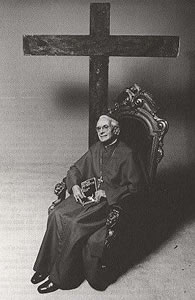
Roger Peyrefitte (17 augustus 1907 – 5 november 2000)
De Amerikaanse schrijfster Nicola Kraus werd geboren op 17 augustus 1974 in New York. Zie ook mijn blog van 7 februari 2009.
Uit: Citizen Girl (Samen met Emma McLaughlin)
„The ladies’ room door squeaks open and I stop breathing, jerking my feet up on the toilet seat lid in an effort to work through my lunch hour in solitude. Rubber soles scuff along the honeycomb tiles as I bend to inch the remains of my lunch out of view, but my pen betrays me, rolling brazenly out of my lap and onto the warped floor.
“Who’s in here?” my boss, Doris, shouts over the din of sweatshop sewing machines whirring up the air shaft. I consider not responding — maybe she’ll think the pipes are now leaking not only asbestos but pens. “Hello-o?” She knocks once on the last stall door before rattling it forcefully. Her tightly permed gray curls appear below me. “Oh, Girl, it’s you.”
I will a cheery smile.
“You have your period again, don’t you?” She stares up disdainfully as she turns a deep red from her inverted stance. “You know, Girl” — she takes in my research materials on the floor — “I’ve provided you with a perfectly good desk.”
“Yes, thank you…” I try to dislodge my crossed legs without stepping on her face. “I was just taking advantage of the quiet to finish my presentation for the conference.” I unlatch the door, and she abruptly shoves it in toward me, spraying the cup of coffee I’d balanced on the toilet-paper dispenser onto my coat. My new coat.
She arches her eyebrows over her multicolored Fimo clay bifocals. “You’re a mess,” she pronounces. “You really should make your lunch at home and bring it with you. You’re not managing your finances very well if you buy those expensive sandwiches every day. But I guess that’d mean you’d actually have to get out of bed on time.” She remains squarely in the stall doorway, indicating that I owe her an explanation.“
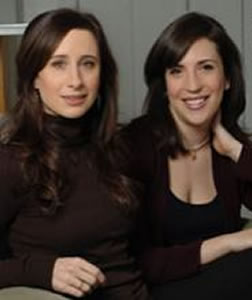
Nicola Kraus (New York, 17 augustus 1974)
Emma McLaughlin en Nicola Kraus (rechts)
De Amerikaanse dichter en schrijver Ted Hughes werd geboren op 17 augustus 1930 in Mytholmroyd, Yorkshire. Zie ook mijn blog van 17 augustus 2006 en ook mijn blog van 17 augustus 2008 en ook mijn blog van 17 augustus 2009.
Wind
This house has been far out at sea all night,
The woods crashing through darkness, the booming hills,
Winds stampeding the fields under the window
Floundering black astride and blinding wet
Till day rose; then under an orange sky
The hills had new places, and wind wielded
Blade-light, luminous black and emerald,
Flexing like the lens of a mad eye.
At noon I scaled along the house-side as far as
The coal-house door. Once I looked up –
Through the brunt wind that dented the balls of my eyes
The tent of the hills drummed and strained its guyrope,
The fields quivering, the skyline a grimace,
At any second to bang and vanish with a flap;
The wind flung a magpie away and a black-
Back gull bent like an iron bar slowly. The house
Rang like some fine green goblet in the note
That any second would shatter it. Now deep
In chairs, in front of the great fire, we grip
Our hearts and cannot entertain book, thought,
Or each other. We watch the fire blazing,
And feel the roots of the house move, but sit on,
Seeing the window tremble to come in,
Hearing the stones cry out under the horizons.
Pied Beauty
Glory be to God for dappled things—
For skies of couple-colour as a brinded cow;
For rose-moles all in stipple upon trout that swim;
Fresh-firecoal chestnut-falls; finches’ wings;
Landscape plotted and pieced—fold, fallow, and plough;
And áll trádes, their gear and tackle and trim.
All things counter, original, spare, strange;
Whatever is fickle, freckled (who knows how?)
With swift, slow; sweet, sour; adazzle, dim;
He fathers-forth whose beauty is past change:
Praise him.

Ted Hughes (17 augustus 1930 – 28 oktober 1998)
De Franse dichter en schrijver Robert Sabatier werd geboren op 17 augustus 1923 in Parijs. Zie ook mijn blog van 17 augustus 2008 en ook mijn blog van 17 augustus 2009.
Uit: Le lit de la merveille
” Va où il y a des livres…”
Sur ce conseil insolite d’un clochard, le jeune Julien, qui traîne dans le Paris de l’après-guerre le souvenir d’une blessure d’amour, trouve un petit emploi chez un libraire. Il rencontre Roland, un étudiant dandy, qui le présente bientôt à sa mère Eleanor, une Américaine de Boston, éprise de littérature et d’art français. Ainsi va commencer pour Julien un roman d’apprentissage que Stendhal n’eût pas désavoué.
Apprentissage du monde, d’abord, dans un Paris où l’on croise Aragon, Bachelard, Asturias ou Darius Milhaud. Initiation amoureuse, aussi, qui, bien qu’elle finisse mal, aidera le jeune homme à trouver son destin. Mais la grande affaire, ce sont les livres. ” Viens creuser le lit de la merveille “, a dit à Julien un vieil émigré de l’Est en l’entraînant dans sa bibliothèque. Il ne l’oubliera plus. A travers cette peinture attendrie et souriante du Boul’Mich’ et du Saint-Germain d’autrefois, le romancier des Allumettes suédoises et du Cygne noir salue sa propre jeunesse et la passion de sa vie : la lecture.“
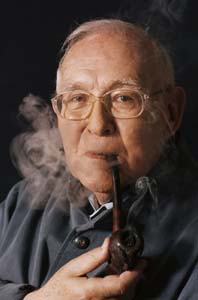
Robert Sabatier (Parijs, 17 augustus 1923)
De Russische dichter Anton Delvig werd geboren op 17 augustus 1798 in Moskou. Zie ook mijn blog van 17 augustus 2008 en ook mijn blog van 17 augustus 2009.
Romance
Don’t say that love will come and go,
Your friend suggests that you forget it,
He thinks that it’s eternal, so
His happiness, he says he’ll bet it.
Why should my soul suppress the will
That flashed and seized me suddenly,
Now let me give myself, and humbly,
All to your tenderness and thrill.
Why should I suffer? What has love
Donated me from up above?
Except for wounds and bitter tear,
Except for sorrow, pain and fear?
Though love is not a lasting thing
I’ll never see it kiss the ground,
I’ll die with it like the sad sound
Of an abruptly broken string.
Love
Well, what is love? A rambling dream,
The link of charm and admiration!
And you, in reverie and aspiration,
Now moan in agony, now seem
To doze, absorbed in golden slumbers,
And stretch your hand to dreams ahead
Forgetting all your drowsy rambles,
Unwell, and with a heavy head.
Vertaald door Alec Vagapov
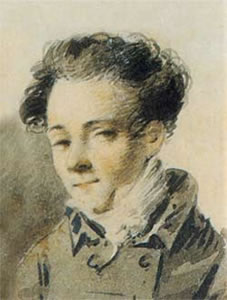
Anton Delvig (17 augustus 1798 – 26 januari 1831)
De Duitse dichter en schrijver Theodor Däubler werd geboren op 17 augustus 1876 in Triëst. Zie en ook mijn blog van 17 augustus 2009.
Regen
Die Sonne hat nur kurz das nasse Tal umschlungen,
Die Pappeln rauschen wieder, neckisch spielt der Wind
Des Baches Schwermut hat gar lang allein geklungen,
Der Wind ist pfiffiger als ein vergnügtes Kind.
Die Wolken wollen kommen. Alles wurde rauher,
Die blassen Pappeln rascheln wie bei einem Guß.
Die nassen Weiden faßt ein kalter Schauer,
Gewaltig saust die Luft, beinahe wie ein Fluß.
Nun soll der Regen kommen! Und es gieße wieder!
Der Sturm ist kraftbegabtes Lautgebraus,
Der Regen bringt die Rhythmen heller Silberlieder,
Die Pappeln wissen das und schlottern schon voraus.
Dem nassen Tal entwallen kalte Atlashüllen,
Und auch die Nebelhauche tauchen raschelnd auf.
Der Wind beginnt die Flur mit Wispern zu erfüllen,
Die Pappeln biegen sich, das Grau nimmt seinen Lauf.

Theodor Däubler (17 augustus 1876 – 13 juni 1934)
De Poolse dichter en schrijver Józef Wittlin werd geborern in Podolien op 17 augustus 1896 in het toenmalige Oostenrijk-Hongarije. Zie en ook mijn blog van 17 augustus 2009.
Hymn of Hatred (Fragment)
Oh no! I will not sing of love today, of what is sacred, angelic, and eternal, powerful
like God, like the immortal He.–I will not sing a hymn of love.
Oh yes! Oh yes! Hatred walks on our streets, snickers, hands on her
hips, totters like a drunk, like that ultimate streetwalker and spits in
the face of anyone who dares to live.
Both you and me.
And oh, how her blinkers blaze!
She saw the cross on a shrine’s golden cupola and a torrent poured
down on it from her piercing eyes. And the cross rusted in shame and
blackened in offense.
Oh, how that once gold cross did turn black.
She cast an abusive word into the church, through the wide open
doors, and holy icons paled and heads turned in their halos, and the
host was covered in mold and spoiled
before it was brought before the people congregated in hunger for the
miracle of
love!…
Oh terrible defiled host!
Hatred walks on our streets…and when she spies a mother, a mother
who
carries the fetus of a child in her womb–the fetus has already turned
to vermin.–And the vermin
chew the maternal womb.
Oh, how awfully the vermin chew the mother’s womb!…
And hatred bewitched an infant in its cradle,
touching it’s shoulders–
And when the mother presses her child to her breast.
And when the mother kisses her infant’s little mouth
–vile leprosy descends on her maternal visage.
Oh, how foully leprosy deformed the mother!

Józef Wittlin (17 augustus 1896 – 28 februari 1976)
Portret door Stefan Mrożewski
De Ierse dichter en schrijver Oliver St. John Gogarty 17 augustus 1878 in Dublin. Hij werkte ook als arts, piloot. Zie en ook mijn blog van 17 augustus 2009.
Ode of Welcome
The Gallant Irish yeoman
Home from the war has come
Each victory gained o’er foeman
Why should our bards be dumb.
How shall we sing their praises
Our glory in their deeds
Renowned their worth amazes
Empire their prowess needs.
So to Old Ireland’s hearts and homes
We welcome now our own brave boys
In cot and Hall; neath lordly domes
Love’s heroes share once more our joys.
Love is the Lord of all just now
Be he the husband, lover, son,
Each dauntless soul recalls the vow
By which not fame, but love was won.
United now in fond embrace
Salute with joy each well-loved face
Yeoman: in women’s hearts you hold the place.

Oliver St. John Gogarty (17 augustus 1878 – 22 september 1957)
Portret door Gerald Leslie Brockhurst
De Zweedse schrijfster Fredrika Bremer werd geboren op 17 augustus 1801 in Tuorla bij Piikkiö. Zie en ook mijn blog van 17 augustus 2009.
Uit: Nina. Old Acquaintances
„Are you now all assembled here t”—Bellmix. We enter an apartment where soft sofas, handsome mats, clear mirrors, rich window drapery, and so forth, present that picture of comfort, which the great artist of the present age—Utility, pre-eminently strives to establish. With a somewhat over-heated head inclining over a chess hoard, sits on a sofa, the well- preserved President, his Excellency Von G. Before him we see his daughter Edla busily intent upon being check-mated by her father, partly because she has already won one game of him, partly because his Excellency was not in the very best humour. However, the game and the humour of the President now all at once begin to brighten up. “Edla,” he observed,” the queen is a precious piece ; without her there is no life in the game. You must excuse me now for taking yours to give check …. and check-mate you 1″ “Check-mate? Yes, irretrievably!” exclaimed Edla. ” That, upon my word, was an excellent move. How foolishly my bishops stand there.” His Excellency turned up his nose, snuffed, and chapter{Section 4could not for the world suppress a hearty laugh at the astonished look of his daughter, then he very pleasantly said: ” My good child, if you are not too weary with being check-mated, give me a cup of tea.” ” Directly,” said Edla, with gladsome readir.’ess. The President stretched himself out very comfortably on the sofa. At a little distance from these, we behold another group near the window. A very handsome young lady is occupied in painting some fresh flowers, which stand before her in a glass. Another lady, not young, and still less handsome, but with a most elaborate toilette, sits next to her embroidering a shepherdess in tapestry.“
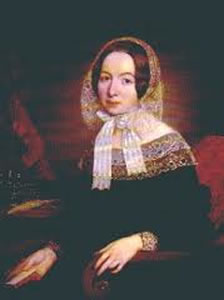
Fredrika Bremer (17 augustus 1801 – 31 december 1865)
Portret door Olaf Johan Södermark




























